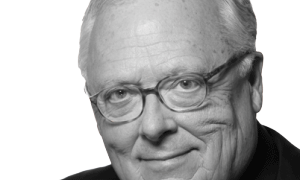Wisconsin and Welfare: Work Works
Edwin J. Feulner
 “It’s so evident that work is the only way to get people out of poverty.” “It’s so evident that work is the only way to get people out of poverty.”
Chris Kapenga, a Wisconsin state senator, said the sentence above in regard to welfare reform legislation recently passed in the Badger State. “We’re going to help people get 30 hours of work and move them closer to being self-sustained.”
Of course, the state senator is only half right; the other steady road out of poverty is a healthy marriage. But the basic facts about the gains of work and marriage still seem to elude some people.
Promoting work and marriage are the goals of welfare reform. Contrary to the caricature painted by liberals, conservatives don’t lack compassion for the poor. Quite the opposite. We know a failure to institute work requirements robs those in poverty of their dignity — that if they’re able to work, we do them no favors by engaging in a simple handout. And the collapse of marriage in low-income communities has had devastating effects on men, women and children.
That’s why Gov. Scott Walker and his state deserve credit for taking the lead on reform issues. Among other things, the latest reforms establish work requirements for housing programs and strengthen already existing work requirements in food stamp programs.
It may surprise some people that such requirements are even necessary. Don’t we, they may ask, already have them at the federal level?
We do, but it’s not as widespread as they may think. There are more than 80 means-tested federal welfare programs, yet only two have substantial work requirements: The Supplemental Nutrition Assistance Program and Temporary Assistance for Needy Families.
And of the 3,000 federal housing authorities, only 39 require any sort of work as a condition for housing assistance.
That’s where the Wisconsin reforms come in. They expand work requirements to all work-capable state residents who receive federal housing assistance.
“The generosity of federal housing subsidies and the expense of the program make it a good target for reform,” writes welfare expert Marissa Teixeira. “This measure will help those who utilize housing vouchers to reduce their dependency on government.”
Another new Wisconsin measure that would encourage self-sufficiency: Increasing the number of work hours required of able-bodied adults without dependents from 20 a week to 30. The state is also expanding work requirements for parents with children above the age of six who apply for food stamps.
Some critics paint this an unreasonable. But if we’re interested in actually lifting individuals and their dependents out of poverty — to break the crippling cycle that often ensnares multiple generations — this is what we need to do.
Consider the success of the 1996 reform, which the Wisconsin one is built on. “That law, among other things, introduced work requirements to the Temporary Assistance for Needy Families program,” Ms. Teixeira writes. “The result was a 50 percent increase in employment among never-married mothers and a one-third decrease in poverty among that group.”
Wisconsin’s latest reforms offer a model for other states. Its efforts, in fact, remind me of a key recommendation in “Solutions 2018,” The Heritage Foundation’s latest policy briefing book: that when it comes to welfare reform, we should return fiscal responsibility to state governments.
Those governments administer many federally funded welfare programs, but inefficiency abounds — which is hardly surprising, considering that it’s not their money on the line. But if we began to shift things so that states not only administer but pay for the programs with state resources, we can expect that to change.
The final crucial element of reform, courtesy of “Solutions 2018”: We need to do much more to promote marriage, which is a proven weapon against child poverty.
Marriage reduces the probability of child poverty by a whopping 80 percent. Children in single-parent homes, by contrast, are more than five times more likely to be poor, compared to their peers in homes with both parents.
As President Lyndon Johnson said of the War on Poverty, “Our aim is not only to relieve the symptom of poverty, but to cure it.” Wisconsin is pointing the way. Will other states follow?
 Edwin J. Feulner’s leadership as president of The Heritage Foundation transformed the think tank from a small policy shop into America’s powerhouse of conservative ideas and what the New York Times calls “the Parthenon of the conservative metropolis.” Edwin J. Feulner’s leadership as president of The Heritage Foundation transformed the think tank from a small policy shop into America’s powerhouse of conservative ideas and what the New York Times calls “the Parthenon of the conservative metropolis.”
After serving as president from 1977 to 2013, Feulner served as president again for a brief period in 2017. Heritage’s influence grew immensely that year. After President Donald J. Trump’s inauguration, there were a number of conservative policy victories, most notably tax reform, and The Heritage Foundation played a role in all of them. In just its first year, the Trump administration embraced nearly two-thirds of the policy recommendations from Heritage’s five “Mandate for Leadership” publications."Ed Feulner has made Heritage not just a permanent institution on Capitol Hill, but the flagship organization of the entire conservative movement,” Board Chairman Thomas A. Saunders said in December 2012.
As Feulner wrote in the introduction to one of his books, The March of Freedom: “This has been a conscious goal of The Heritage Foundation—to be a permanent Washington presence. We have set out to make conservative ideas not just respectable but mainstream. To set the terms of national policy debate. To offer not a lament for a lost America, but positive, practical, free market alternatives to the failed liberal policies of the old order.”
Feulner’s work in the conservative movement throughout his life has earned him praise from a range of individuals from Heritage donors to U.S. Presidents.
“By building an organization dedicated to ideas and their consequences, he has helped to shape the policy of our Government. His has been a voice of reason and values in service to his country and the cause of freedom around the world,” read the citation of the Presidential Citizens Medal, given to Feulner on Jan. 18, 1989, by President Ronald Reagan.
Feulner’s leadership has been internationally recognized. The Daily Telegraph (UK) named him one of the 100 most influential conservatives in America in 2007 and 2010. In a 2009 Forbes magazine article, Karl Rove ranked Feulner the 6th most powerful conservative in Washington. That same year, he was featured by the Fox News Channel on Fox News Sunday as host Chris Wallace’s “Power Player of the Week.” In July 2010, he was included in Townhall magazine’s list of “the 100 Americans the Left hates most.”
In April 2009, the Intercollegiate Studies Institute (ISI) conferred upon Feulner the Charles Hoeflich Lifetime Achievement Award. In June 2012, he received the Bradley Prize for extraordinary talent and dedication at Washington’s Kennedy Center.
Feulner first joined The Heritage Foundation as a founding Trustee in 1973. He later became President in 1977, Heritage’s fourth in four years. After accepting the job, Feulner was determined to chart a new course for the struggling think tank.
www.heritage.org
| 



